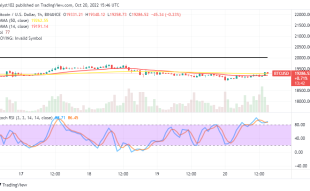Join Our Telegram channel to stay up to date on breaking news coverage
Frustrated messages flooded Aptos’ support channel on Discord on October 19, the day the business published the coins for its new blockchain. In the crypto community, Aptos—which sprang from the ashes of Meta’s Diem digital currency project—had been heralded as a “Solana-killer.” It was immediately obvious that something had gone awry after the launch.
People complained they couldn’t participate in Aptos’ token airdrop, which gave the chain’s native cryptocurrency, APT, to early backers as a reward. On the day of the airdrop, Aptos momentarily banned its Discord page, a move the firm claimed was meant to thwart scammers. This added to their worry.
One of the many people seeking assistance says, “When the drop time came, I was supposed to receive 300 APT tokens [worth roughly $3,000], but I didn’t receive any. He claims that he is prepared to offer the evidence required to prove his eligibility, but “support is ignoring any messages.” There were two options for becoming eligible: either submitting an application to assist with a network stress test or minting a special Aptos NFT. Poliakov carried out the former, but both sides claim they are now empty-handed.
Depending on their level of participation, other community members might have lost out on even greater percentages of the $185 million prize pool. Poliakov claims he is still unable to collect his compensation after a week.
A less than stellar performance
The Ethereum network, which only processes about 15 transactions per second, is being outpaced by Aptos and other rivals such as Solana, Polkadot, and Avalanche (TPS). Although Ethereum had an advantage, its long update cycle has given rivals a chance to catch up. Their goal is to function on par with the established payment networks run by Visa and Mastercard, the latter of which asserts to be capable of 65,000 TPS at full throttle.
This aim, however, has not materialized in reality. Since Aptos went live, the blockchain’s performance hasn’t even come close to being at its peak. To the amusement of the crypto Twitter, the network is currently only recording 18 TPS, only slightly better than Ethereum. On the day of the launch, a skeptic blogging under the pseudonym R89Capital wrote, “Wow, what a big stride forward for the space.” Another, who goes by the handle Paradigm Engineer #420, wrote, “Aptos is broken.”
Not only did the network’s performance draw snickers, but the price of the APT token plummeted sharply in the hours following the start of trade, giving community members even less of a return on their labors. Due to variations in the dates the first transactions were recorded, there is significant disagreement regarding the magnitude of the decline. But the aggregator website CoinGecko had the token at a 50% loss (from $13.73 to $6.75), claiming to have made its first trade just three minutes after APT was launched on exchanges.
Other members of the community have criticized Aptos for delaying the release of the tokenomics—a explanation of how tokens will be distributed, how they will operate, and when they will go into circulation—which is considered poor form. It’s comparable to asking someone to sign a contract without outlining all the terms in advance.
Despite these issues, Aptos CEO Mo Shaikh largely ignores the launch’s detractors. “For a brand-new network, [the] Mainnet launch has gone better than anticipated. In less than two days, the network attained peaks of more than 100 TPS and close to 3 million transactions, according to him. This TPS value is lower than Solana’s, which is currently hovering around 4,500 TPS, but greater than some competing networks’ performance.
According to Shaikh, the current top goal is to make sure developers have access to everything they require in order to start creating apps on top of Aptos. The amazing transaction numbers that the Aptos blockchain is designed for won’t be visible until then, he asserts.
Pockets full of money
Heavyweight venture capital firms including Andreesen Horowitz, FTX Ventures, Coinbase Ventures, and Binance Labs support Aptos. A Bloomberg story estimated the valuation of the most recent investment round at $4 billion, despite the fact that the specifics were kept private.
According to the tokenomics Aptos eventually disclosed, each of these VC backers is expected to receive a disproportionately large volume of tokens. A combined volume of 32.48 percent will be given to developers and private investors, prompting concerns about whether this would skew the network’s economics. This protection does not extend to staking incentives, even if VCs and devs cannot sell any tokens for at least a year and cannot access their whole allotment until 2026. (equivalent to interest payments). Theoretically, investors in Aptos may make significant profits on their shares, which could subsequently be sold at a loss, putting downward pressure on the price.
The team’s workload prior to launch, according to Shaikh, is to blame for the oversight that the tokenomics “should have been out sooner.” However, he asserts that the share is “among the lowest […] for any blockchain in the market today,” in response to worries over the amount allocated to investors.
In the past, Shaikh and his cofounder Avery Ching collaborated on Novi, a cryptocurrency wallet designed to support the Diem stablecoin. They describe to the Aptos network as the “layer 1 for everyone” in reference to the goal of creating an inexpensive, scalable, adaptable, and user-friendly blockchain.
The Move programming language, which was created from scratch to power the Diem blockchain, will play a significant role in whether Aptos is able to achieve this goal. The theoretical peak performance of the language is 160,000 TPS, which is much higher than the theoretical peaks of both Ethereum and Solana.
The Aptos team rejects the moniker of “Solana-killer” in public. However, despite the fact that Solana was created to execute transactions more quickly than Ethereum, Aptos pledges to outperform Solana.
According to David Shuttleworth, senior DeFi economist at ConsenSys, a development company founded by Ethereum cofounder Joe Lubin, this rivalry is beneficial for the blockchain ecosystem. He asserts that technological advancements “should always be sought, at every level, not just blockchain,” and they shouldn’t be restricted to a single ecosystem or protocol.
In order to have a beneficial impact on the ecosystem as a whole, a blockchain doesn’t even need to be successful, according to Paul Brody, a board member of the Enterprise Ethereum Alliance, an organization working to promote the use of Ethereum in commercial settings.
Developers seem happy
Shaikh is depending on the software developers who are already using Aptos to drive its expansion, but they don’t believe it will fail. Topaz Nick, the founder of one of the earliest Aptos NFT marketplaces, said that the launch went “very well.”
He claims, “It’s fairly clear to us that Aptos is the future of Web3.” “It’s the most effective, highest capacity blockchain. Additionally, the development experience is already amazing.
Another developer, Gabriel Lan Pham, whose team created the Fewcha crypto wallet for Aptos, says it was risky to choose to develop for a new platform but was worthwhile. Fewcha is probably going to gain from being one of the pioneers in the space if Aptos does grow to be as popular as Ethereum. He claims that even in the worst-case scenario, his team will have learned important lessons about blockchain development. According to Lan Pham, “We have a strong belief that blockchain will be the next big thing in technology, comparable to the internet in the 2000s or smartphones in [the] 2010s.”
Neither developer claims to be worried about the network’s ability to scale, nor do they seem to give much thought to claims that Aptos will replace Ethereum or Solana. If all Aptos engineers share this sentiment, the network’s future won’t be affected by the network’s rocky token airdrop or the ire of early adopters—if they create it, new community members will come.
According to Lan Pham, the Aptos ecoystem has potential. “We must work diligently and construct. Only quality products will endure.”
Read more:
- Aptos is off to a rocky start, but its prospects may not be all that bad; D2T goes on presale
- Aptos Labs Raises $200 Million From Binance Labs And Other Investors
- Crypto Winter is Tough. The Following Are Five Crucial Survival Advices
Join Our Telegram channel to stay up to date on breaking news coverage


